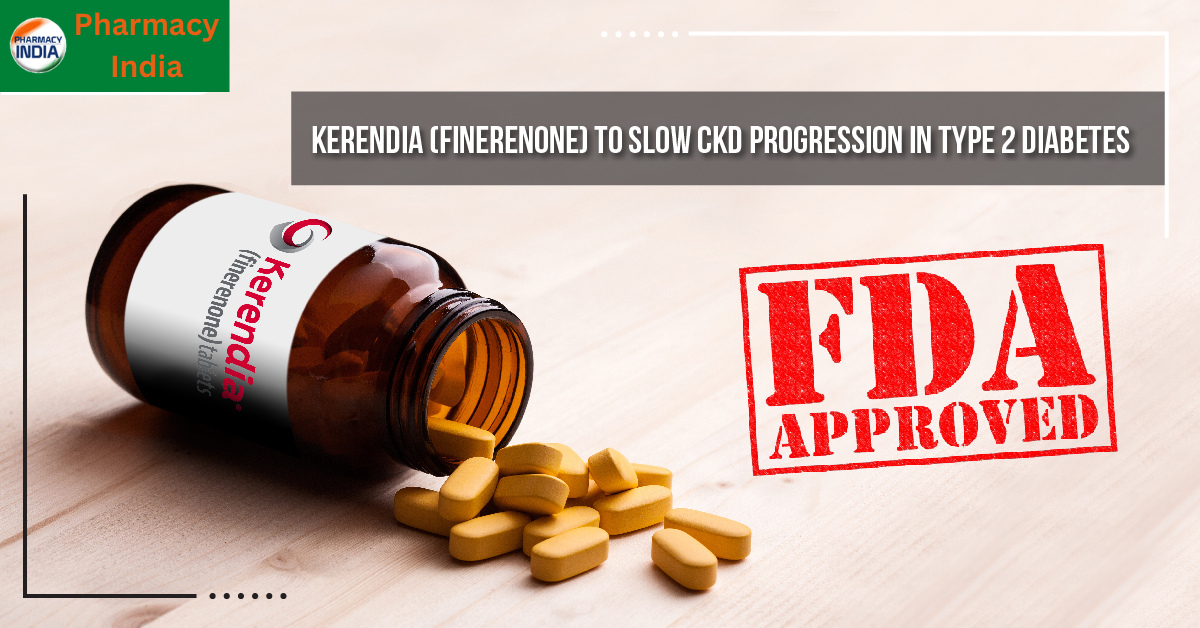The phase III FIGARO-DKD study’s findings on cardiovascular (CV) outcomes received approval from the European Commission for inclusion on Kerendia’s (finerenone) label in the European Union (EU). According to the study, Kerendia decreased the risk of cardiovascular events in a large group of individuals with stages 1-4 CKD and T2D. The early phases of CKD linked to T2D are now included in the indication for Kerendia (10 mg or 20 mg), a non-steroidal, selective mineralocorticoid receptor antagonist. Adults with type 2 diabetes and chronic renal disease (accompanied by albuminuria) can now be treated with Kerendia.
The European Society of Cardiology (ESC) Congress 2021 was the venue for the presentation of the crucial phase III FIGARO-DKD study’s findings, which were also simultaneously published in the New England Journal of Medicine. In about 7,400 patients with CKD and T2D, FIGARO-DKD evaluated the effectiveness and safety of finerenone versus a placebo and standard of treatment on the reduction of CV morbidity and death. Positive results from the FIGARO-DKD study showed that finerenone significantly decreased, compared to placebo, the risk of cardiovascular events in adult patients with CKD and T2D.
Cardiovascular events are more likely to occur in patients with chronic kidney disease, according to Professor Peter Rossing, director of complications research at the Steno Diabetes Center Copenhagen. Patients with type 2 diabetes should have regular checkups with their doctor to look for the earliest indications of kidney disease because it often progresses silently and without symptoms in the early stages. Once diagnosed, patients should receive comprehensive treatment to lower their risk of cardiovascular complications and death.
Overactivation of the mineralocorticoid receptor (MR) can be caused by metabolic, hemodynamic, inflammatory, or fibrotic events, and it can accelerate the progression of CKD and damage to the cardiovascular system. By targeting a different pathway, Kerendia provides security by selectively binding to the MR receptor and obstructing the negative effects of MR overactivation.
Dr. Michael Devoy, chief medical officer of Bayer’s Pharmaceuticals Division, stated that even when blood glucose levels and hypertension are under good control, patients with chronic renal disease and type 2 diabetes still have a high risk of cardiovascular events and kidney disease progression. “Kerendia tackles a critical factor in progression of the disease that is not tackled by alternative treatments and provides doctors with a unique way to safeguard patients against additional kidney impairment and cardiovascular problems. With Kerendia having shown kidney and cardiovascular benefits in the pivotal phase III studies over a wide range of disease severity, today’s approval of the label extension authorises the use of this medication also in patients with earlier phases* of type II diabetes and chronic kidney disease.
In February 2022, the European Commission granted Kerendia initial marketing authorization for the treatment of CKD (stages 3 and 4 with albuminuria) linked with T2D in adults on the basis of the favourable findings of the FIDELIO-DKD phase III research. The expanded EU label for Kerendia now includes information from more than 13,000 CKD patients and T2D, based on the phase III FIDELIO-DKD and FIGARO-DKD investigations, as a result of the European Commission’s approval.
A non-steroidal, selective mineralocorticoid receptor (MR) antagonist called Kerendia has been demonstrated to counteract the negative effects of MR overactivation. The development of CKD and cardiovascular disease are aided by MR overactivation, which may be brought on by metabolic, hemodynamic, inflammatory, or fibrotic causes.
Based on the promising findings of the FIDELIO-DKD Phase III study, the US Food and Drug Administration (FDA), the European Commission (EC), and the Chinese National Medical Products Administration (NMPA) all granted Kerendia marketing authorization in July 2021, February 2022, and June 2022, respectively. In September 2022, Bayer declared that it has been granted permission by the US FDA to revise Kerendia’s label to incorporate the results of the phase III FIGARO-DKD CV outcomes study. A label extension for Kerendia to encompass early stages of CKD associated with T2D was approved by the European Commission in February 2023 based on the phase III FIGARO-DKD data. The Japanese Ministry of Health, Labour, and Welfare granted Kerendia approval in March 2022 based on the favourable findings of both pivotal Phase III studies, FIDELIO-DKD and FIGARO-DKD (MHLW). Following submissions for marketing authorisation, additional regulatory licences by different health authorities in numerous other nations have been given or are presently pending.
In addition to the phase II study CONFIDENCE, the phase III study programme with finerenone, FINEOVATE, now consists of five phase III studies: FIDELIO-DKD, FIGARO-DKD, FINEARTS-HF, FIND-CKD, and FIONA. The phase III programme with finerenone in CKD and T2D includes two finished and published studies, FIDELIO-DKD and FIGARO-DKD, assessing the effect of finerenone versus placebo on top of the standard of care on both renal and cardiovascular outcomes. This programme has randomised more than 13,000 patients with CKD and T2D around the world.
The prespecified FIDELITY pooled analysis, which included the FIDELIO-DKD and FIGARO-DKD studies, examined the effectiveness and safety of finerenone across the spectrum of patients with CKD in T2D in reducing the risk of chronic kidney disease progression as well as fatal and nonfatal CV events. It also offered insights into the relationship between CKD stage (based on baseline Kidney Disease: Improving Global Outcomes – KDIGO – risk.
Underdiagnosed and sometimes fatal, chronic kidney disease (CKD) is a widespread disorder. CKD develops slowly and unpredictably, and many symptoms don’t manifest until the disease is far along. One of the most common consequences of diabetes is CKD, which also increases the risk of cardiovascular disease on its own. In up to 40% of type 2 diabetic patients, chronic kidney damage develops. Patients with CKD with T2D continue to have a high risk of CKD progression and cardiovascular events despite medications that follow recommended guidelines. Over 190 million T2D patients are thought to be affected by CKD globally. End stage renal disease, which necessitates dialysis or a kidney transplant to remain alive, is primarily caused by chronic kidney disease in type 2 diabetes. Patients who have both type 2 diabetes and chronic renal disease are three times more likely to pass away from a cardiovascular cause than people who only have type 2 diabetes.





